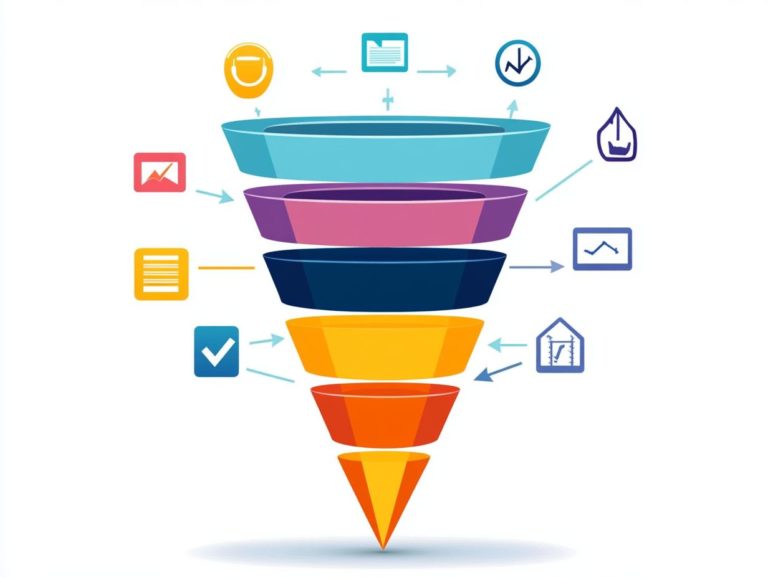5 Tips for Generating Leads in the Manufacturing Sector
Let's Set Up Your Lead Generation Strategy
Fill out the form below, and our team will get in touch with you to create a tailored solution for your business.
In today’s fiercely competitive landscape, manufacturers are continually on the lookout for innovative ways to generate leads. They’re focused on fostering growth through effective techniques, such as ways to attract potential customers.
This article unveils five essential strategies tailored to help you stand out and attract potential clients. From crafting engaging content to harnessing the power of social media and attending key industry events, these actionable tips are designed to address the unique challenges of the manufacturing sector.
We’ll also explore how to measure success and adapt your strategies in response to evolving market trends. This ensures that your lead generation efforts remain relevant and effective.
Jump in now to supercharge your lead generation strategy and take your business to the next level!
Contents
- Key Takeaways:
- 1. Create Engaging and Informative Content
- 2. Utilize Social Media for Outreach and Networking
- 3. Attend Industry Events and Conferences
- Let's Set Up Your Lead Generation Strategy
- 4. Offer Free Consultations or Demos
- 5. Use Email Marketing and Follow Up Regularly
- How Can Manufacturers Generate More Leads?
- Let's Set Up Your Lead Generation Strategy
- Let's Set Up Your Lead Generation Strategy
- Frequently Asked Questions
- What are some effective tips for generating leads in the manufacturing sector?
- Why is social media a valuable tool for lead generation in the manufacturing sector?
- How can attending industry events and trade shows help generate leads?
- What type of content should be created to attract potential leads?
- How effective are free consultations or product samples in generating leads?
- Why is collaborating with other businesses beneficial for lead generation in the manufacturing sector?
Key Takeaways:

- Engaging and informative content is crucial for generating leads. This includes creating educational blogs, videos, and webinars that showcase your expertise and offerings.
- Utilizing social media platforms like LinkedIn and Twitter can greatly expand your reach and help you connect with potential customers.
- Attending industry events and conferences is a great way to network and build relationships with potential clients, showcasing your products and services.
1. Create Engaging and Informative Content
In the realm of lead generation, creating engaging and informative content is essential for capturing the interest of B2B buyers and enhancing your marketing strategy. This is particularly important in the industrial marketing sector, where decision-makers seek valuable insights to inform their purchases.
Diverse content offers, such as eBooks, webinars, and detailed case studies, can resonate with specific buyer personas. By understanding their unique pain points and preferences, you can tailor these offers to meet the precise needs of your audience, fostering an environment of trust and credibility.
This alignment cultivates deeper connections and significantly boosts your lead generation efforts. Incorporating visual elements and presenting a compelling value proposition are crucial strategies that elevate engagement, making the content digestible and driving your potential for conversions.
2. Utilize Social Media for Outreach and Networking
Social media platforms like LinkedIn offer powerful avenues for outreach and networking. They allow you to connect with decision-makers and generate online leads through targeted digital marketing campaigns.
Beyond formal networking, sharing valuable and engaging content that resonates with your target audience is key. By crafting insightful articles, infographics, and videos, you can position your brand as a thought leader in your industry.
Participating in relevant groups or forums lets you showcase your expertise and engage directly with potential clients. This dual approach enhances your brand visibility while fostering genuine interactions.
Social media’s analytics tools are invaluable for identifying leads, providing insights into audience behaviors and preferences that help refine your targeting strategies for more effective customer engagement.
3. Attend Industry Events and Conferences
Attending industry events and conferences is essential for your lead generation strategy. These events provide opportunities to network with potential clients, gather valuable insights, and build brand trust that enhances your sales pipeline.
Engaging in face-to-face interactions at these gatherings fosters meaningful relationships and allows you to understand market trends and customer needs. Events like trade shows and seminars showcase the latest advancements and open doors for collaborations that drive innovation.
By participating in discussions and panels, you can position yourself as a thought leader, further bolstering your credibility. This direct engagement is known to boost lead conversion rates, turning fleeting connections into lasting partnerships that benefit everyone involved.
Let's Set Up Your Lead Generation Strategy
Fill out the form below, and our team will get in touch with you to create a tailored solution for your business.
4. Offer Free Consultations or Demos

Offering free consultations or product demonstrations is a highly effective technique for capturing leads. This approach gives B2B buyers a direct glimpse into your offerings while leveraging persuasive CTAs (Calls to Action) to attract high-quality leads.
By focusing on specific pain points—like operational inefficiencies or budget constraints—these consultations guide potential clients to make confident choices. For instance, using compelling CTAs such as “Don’t miss out—schedule your free consultation now!” prominently urges immediate action, turning interest into meaningful engagement.
Following up after the consultation is crucial for nurturing leads. Through personalized emails or calls, businesses can reinforce the value of their offerings and clarify solutions tailored to the clients’ needs. This strategy fosters trust and paves a smoother path to conversion.
5. Use Email Marketing and Follow Up Regularly
Using email marketing as a key component of your lead nurturing strategy allows you to maintain consistent engagement with potential clients. This enhances your ROI through well-timed follow-ups and personalized messages that expertly guide leads down the sales pipeline.
Effective segmentation is essential. It ensures that the right message reaches the appropriate audience, making them feel valued and understood. By analyzing customer behavior and preferences, you can tailor your campaigns to address specific needs, leading to higher conversion rates.
In this context, marketing automation plays a pivotal role. It streamlines your processes and enables timely, customized interactions without overwhelming you. Incorporating thoughtful thank-you pages becomes an essential touchpoint, reinforcing positive engagement after initial contact and encouraging future actions while deepening your relationship with potential clients.
How Can Manufacturers Generate More Leads?
Manufacturers can significantly enhance lead generation by employing a range of effective techniques specifically designed for the industrial sector. It’s crucial to understand marketing benchmarks and optimize channels to capture more online leads.
Integrating strategies like SEO (Search Engine Optimization) can improve your visibility on search engines. Meanwhile, content marketing educates and engages potential customers, helping you build a robust online presence. Leveraging paid advertising allows for targeted outreach, ensuring your promotional efforts reach relevant audiences.
To truly optimize these strategies, conducting thorough market research is essential. This research helps identify the specific needs and preferences of your target audience. Aligning your efforts in this way reveals the most effective practices and allows you to craft messages that resonate, ultimately driving higher engagement and conversion rates.
What Are the Key Components of a Successful Lead Generation Strategy?
A successful lead generation strategy involves several key components, including targeted content marketing, effective audience targeting, and thorough buyer research. These elements work in harmony to elevate your conversion rates and align with the needs of decision-makers.
Consider how targeted content marketing creates valuable resources tailored specifically for your defined audience, attracting individuals who resonate with your messaging. This approach is strengthened by precise audience targeting, where you analyze target audience and behaviors to develop customized strategies that capture attention.
Understanding buyer personas is crucial, as it means gaining deep insights into the preferences, pain points, and motivations of your target audience. By prioritizing these personas, you can strategically align your content offers to make them more relevant and compelling, ultimately leading to heightened engagement and improved conversion rates.
What Are the Common Challenges Manufacturers Face in Lead Generation?

Manufacturers frequently encounter significant challenges in lead generation. These include engaging decision-makers, aligning marketing strategies with industry demands, and maintaining strong customer engagement.
Let's Set Up Your Lead Generation Strategy
Fill out the form below, and our team will get in touch with you to create a tailored solution for your business.
Limited resources often magnify these obstacles, constraining marketing efforts and leading to missed opportunities. The competitive landscape adds another layer of complexity, as many manufacturers struggle to distinguish their offerings in a market flooded with similar products.
To tackle these challenges effectively, companies like yours can implement targeted strategies and innovative industrial marketing. Using data analysis can provide valuable insights into the customer journey, including user engagement and lead capture. This ensures your messaging resonates with key stakeholders.
Fostering collaborations with industry influencers can enhance your visibility and credibility. This ultimately drives more qualified leads and optimizes your sales funnel, including effective lead nurturing.
How Can Manufacturers Measure the Success of Their Lead Generation Efforts?
Measuring the success of your lead generation efforts is essential for manufacturers. It requires using analysis tools along with established marketing benchmarks to evaluate ROI and refine your future strategies.
By monitoring key metrics such as conversion rates, lead quality, and customer acquisition costs, you will gain deeper insights into your marketing performance. Conversion rates illustrate how effectively you’re turning potential leads into satisfied customers. Meanwhile, understanding lead quality helps gauge the likelihood of a lead becoming a long-term buyer.
Understanding customer acquisition costs enables you to analyze the efficiency of your marketing budget. With these data-driven insights at your disposal, you can fine-tune your tactics, optimize your campaigns, and drive better engagement while achieving higher returns on your investment in lead generation.
What Are the Most Effective Lead Generation Tactics for Manufacturers?
Ready to boost your lead generation? The most effective lead generation tactics for manufacturers include using marketing automation for email marketing campaigns, crafting a strategic content marketing plan that focuses on engaging content, and utilizing visual elements like product demonstrations and infographics in PPC ads with call-to-action buttons.
By integrating these strategies, you streamline your outreach efforts and create a compelling presence in the market. With marketing automation, you can follow up with leads at just the right moments by sending personalized emails based on user behavior. This significantly boosts your engagement rates.
A well-defined content marketing plan—complete with case studies, eBooks, webinars, blog posts, and problem-solving content—demonstrates your expertise and builds trust with potential clients. Using eye-catching visuals in your PPC ads can further amplify your results. Manufacturers who incorporate infographics or product demos often see an increase in click-through rates and conversion rates.
Together, these tactics form a cohesive strategy that not only attracts interest but also nurtures leads through the sales funnel. This ultimately drives conversions and maximizes your ROI.
How Can Manufacturers Adapt Their Lead Generation Strategy to Changing Market Trends?
To stay ahead in the game, you need to adapt your lead generation strategies in the automotive industry to the evolving market trends. This requires conducting regular online performance reviews and market research.
Additionally, fine-tuning your audience targeting and lead identification processes is essential. Such adaptability not only boosts customer engagement but also ensures your strategies align with the ever-shifting preferences of consumers.
By proactively monitoring market fluctuations and gathering customer feedback from decision makers in the industrial space, you can uncover new opportunities and avoid potential pitfalls. Effective methods include leveraging software that helps understand customer behavior and maintaining open communication channels.
This enables you to make timely adjustments that genuinely resonate with your audience. Continuously refining your lead generation strategies through market research will enhance your awareness and responsiveness, ultimately positioning you more strongly in a competitive landscape.
Let's Set Up Your Lead Generation Strategy
Fill out the form below, and our team will get in touch with you to create a tailored solution for your business.
Frequently Asked Questions

What are some effective tips for generating leads in the manufacturing sector?
1. Utilize social media channels that enhance brand trust platforms to connect with potential clients and showcase your products/services.
2. Attend industry events and trade shows to network with other businesses and potential customers.
3. Create informative and visually appealing content to attract potential leads and establish your expertise.
4. Offer free consultations or product samples to entice potential clients and showcase your capabilities.
5. Collaborate with other businesses in your industry to reach a wider audience and generate more leads.
Social media allows you to connect directly with potential clients and showcase your products/services in a visually appealing way. You can also target specific demographics and industries, making it a highly effective tool for generating leads in the manufacturing sector.
How can attending industry events and trade shows help generate leads?
Attending these events allows you to network with other businesses and potential clients, giving you the opportunity to showcase your products/services and generate interest. It also helps you stay updated on industry trends and connect with potential partners for collaboration.
What type of content should be created to attract potential leads?
Content should be informative, visually appealing, and relevant to your target audience. This can include product demonstrations, case studies, industry insights, and customer testimonials.
Additionally, it should be shareable on social media to reach a wider audience.
How effective are free consultations or product samples in generating leads?
Offering free consultations or product samples allows potential clients to experience your products/services firsthand, increasing their likelihood of becoming paying customers. This approach showcases your confidence in your offerings and helps establish trust with potential leads.
Why is collaborating with other businesses beneficial for lead generation in the manufacturing sector?
Collaborating with other businesses allows you to tap into their existing customer base and reach a wider audience. It also promotes knowledge sharing and potential partnerships, which can lead to more opportunities for generating leads in the manufacturing sector.






